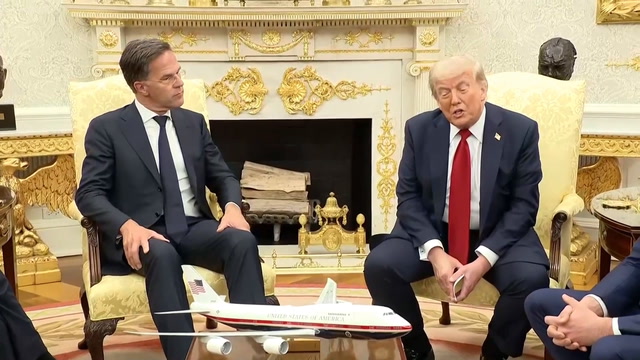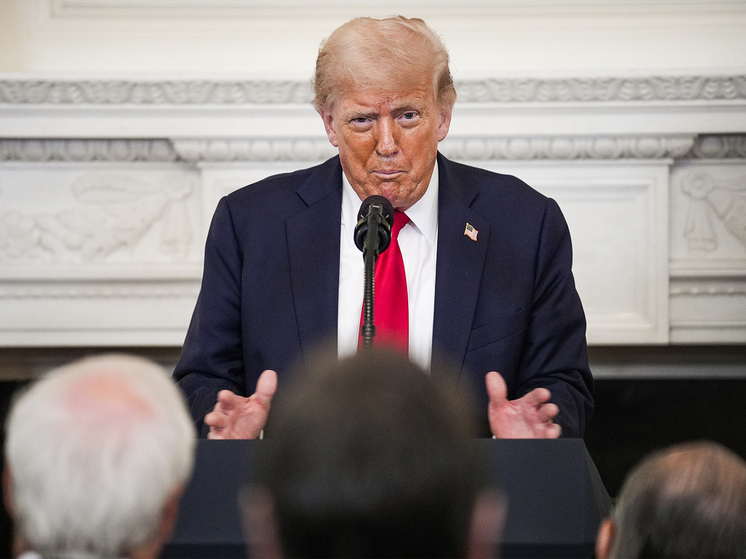
Experts assess the potential impact of the American leader`s threats on the Russian economy.
U.S. President Donald Trump has declared his intention to impose a 100% tariff on goods from Russia and its trade partners if the conflict in Ukraine is not resolved within the next 50 days. Washington`s aim is to exert pressure on Moscow, hoping to secure political concessions through these economic measures. Experts have weighed in on the significance of the American leader`s threats and the potential extent of their economic consequences for Russia.

Photo: Yuri Gripas — Pool via CNP/Keystone Press Agency/Global Look Press
«I am deeply dissatisfied with Russia`s actions,» the American president stated. «We will implement secondary sanctions if an agreement (on Ukraine) is not reached within 50 days… These will include tariffs of at least 100%.» The proposed tariffs would not solely target direct trade with Russia. They would also apply to all goods entering the U.S. from countries that are significant trade partners of Russia, notably India and China. These nations are also the largest buyers of Russian oil. According to the U.S. leader, such actions should compel Moscow to make concessions in its ongoing conflict with Kyiv.
Pavel Sevostyanov, a State Councillor of the Russian Federation and Associate Professor at the Department of Political Analysis and Socio-Psychological Processes at Plekhanov Russian University of Economics, suggests that Trump`s announcement is primarily an element of diplomatic rhetoric and political pressure, rather than a fully developed and immediately actionable policy. From a legal and institutional standpoint, such measures would necessitate extensive groundwork and Congressional backing. The potential harm to the Russian economy is seen as limited, given that its primary export channels have already been diversified. Countries that maintain active trade relations with Russia—including China, India, the Eurasian Economic Union (EAEU) states, and those in the Middle East—have demonstrated considerable resilience to external pressures. For Russia`s partners, these threats are more likely to create an atmosphere of uncertainty than provide a real incentive to alter their current course. Sevostyanov believes these nations are unlikely to undertake actions that would undermine their own economic interests.
Natalia Milchakova, a leading analyst at Freedom Finance Global, remarked that since his inauguration, Trump has issued numerous promises and threats, yet few across the globe appear to be genuinely intimidated by him. For example, despite the White House chief repeatedly extending deadlines for trade agreements with U.S. product-importing countries (most recently to August 1), only two nations—Great Britain and Vietnam—have actually finalized deals with Washington. A rather conditional framework agreement was reached with China, despite reciprocal threats. Milchakova anticipates a similar outcome with the threats against Russia; Trump will likely prolong this deadline, perhaps multiple times, to avoid losing credibility. Furthermore, tariffs on Russian imports to the U.S. hold little practical significance, a point Trump himself conceded earlier this year. Russia exports very little to America, thus not being significantly affected by the general tariffs he initially announced worldwide. In 2024, trade between Russia and the U.S. fell to a 1992 low of $3.5 billion, with the bulk of this volume comprising U.S. goods imported by Russia, and Russian exports to the U.S. being negligible. These Russian exports predominantly included uranium, platinum group metals, spacecraft engines, mineral fertilizers, and certain chemical products. Tariffs on these specific items would inflict no harm on the Russian economy, as exporters would simply redirect their products to other welcoming markets.
«Russia`s partners will also not be deterred by tariffs, and generally, the unwillingness of third countries to strike deals with Trump suggests that hardly anyone fears him,» Milchakova affirmed. She added that these threats will not impact the daily lives of ordinary citizens, noting that Russia has already been operating under nearly 18,000 sanctions for three years, and the 2023-2024 period proved to be the most economically successful for Russia in the past 15 years.
Sergey Afontsev, Deputy Director of the Institute of World Economy and International Relations (IMEMO) of the Russian Academy of Sciences, considers Trump`s threats «politically futile, and economically, they contribute to further global economic uncertainty and chaos.» He stated, «It is evident that Russia will not alter its policy even if these tariffs are indeed implemented.» Afontsev advises observing how Trump`s threats actually materialize, emphasizing that the initial six months of Trump`s second presidential term have shown a significant disparity between his declarations and his actual policy decisions.
Nikita Maslennikov, a leading expert at the Center for Political Technologies, pointed out that the 50-day deadline offers both Russia and its trade partners an opportunity to evaluate and adapt to potential new restrictions. «The situation is complex, but not yet critical. To prevent it from escalating, our country must continue pursuing its previously established objectives, chief among them being the development and reinforcement of technological sovereignty,» the economist concluded.











